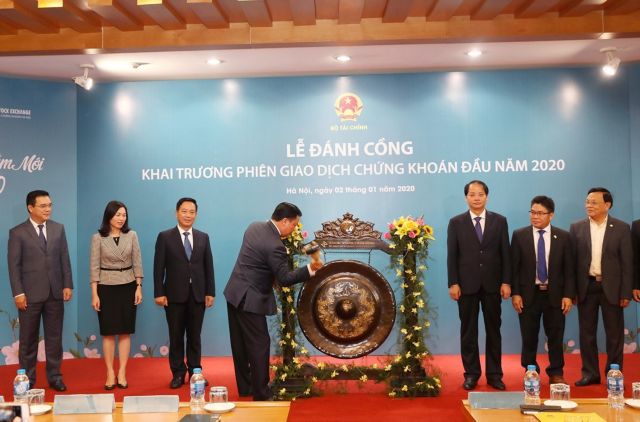A sustainable stock market would help drive Viet Nam’s economic growth and serve the nation, said Minister of Finance Dinh Tien Dung.

A sustainable stock market would help drive Viet Nam’s economic growth and serve the nation, said Minister of Finance Dinh Tien Dung.
Dung made the statement at a ceremony held at the Ha Noi Stock Exchange on Thursday to open the first trading session of 2020.
“This year, the Government plans to complete the equitisation of State enterprises. The Ministry of Finance (MoF) will co-ordinate with other ministries and agencies to direct the State Securities Commission (SSC) and related units to focus on the completion of legal documents for the securities market in early 2021 when the Securities Law takes effect,” Dung said.
“The ministry will also co-operate with other units in the securities industry to accelerate the restructuring of the securities market, with a focus on the establishment of the Viet Nam Stock Exchange and the restructuring of the Ha Noi Stock Exchange (HNX) and the Ho Chi Minh Stock Exchange (HoSE).”
The technology employed by the market would also be comprehensively renovated, Dung said.
The ministry will work closely with firms to remove difficulties for the equitisation and divestment processes at State-owned enterprises and discuss solutions to increase liquidity on the market, diversifying products on the derivatives and underlying markets.
The MoF would strengthen co-operation with the Ministry of Public Securities to bolster inspections and handling of manipulation and insider trading on the stock market, Dung said.
Dung said the SSC should also study and implement measures to prevent and handle risks in order to ensure safety.
In 2019, the stock market increased by 10.6 per cent in terms of capitalisation. The value of the stock market was currently equivalent to 79.2 per cent of the nation’s total GDP, said SSC chairman Tran Van Dung.
In the context of strong fluctuations in global financial markets, investors were looking to withdraw capital from emerging and frontier markets.
However, the inflows of indirect investment from foreign investors into Viet Nam still reached US$2.7 billion, which represented an optimistic assessment of the foreign investor community, he said. — VNS





